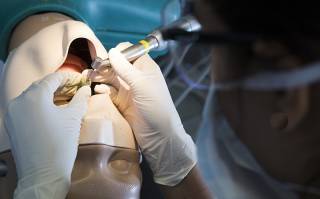Development of a tool to assess oral health-related quality of life in patients in critical care
26 October 2019
Federico Moreno Sancho, Georgios Tsakos, David Brealey, David Boniface, Ian Needleman
Quality of Life Research
It is of concern that recent evidence suggests that oral health deteriorates following hospitalisation in critical care units (CCU). Poor oral health might add an additional burden, affecting the patient’s comfort and limiting the ability to eat and speak. This reduces quality of life, with evidence indicating that it also confers an increased risk for hospital acquired infections. A major limiting factor to further research was the absence of a validated tool to measure oral health-related quality of life in CCU patients (OHQoL).
This study sought to (i) to develop a tool (CCU-OHQoL) to assess OHQoL amongst patients admitted to CCU, (ii) to collect data to analyse the validity, reliability and acceptability of the CCU-OHQoL tool and (iii) to investigate patient-reported outcome measures of OHQoL in patients hospitalised in a CCU.
The new tool showed good acceptability, clear face, content and construct validity and satisfactory internal consistency reliability. It was also quick to administer.
Our assessment of the tool with CCU patients confirmed that deterioration of OHQoL seems to be common. In the study, 37.8% of the participants reported a deterioration in self-reported oral health after CCU admission. Also, 26.9% and 31% of the participants reported considerable negative impacts of oral health in their life overall and quality of life, respectively.
This deterioration of oral health creates yet another burden both for the patient and potentially for their families/carers and yet it could be prevented. Although further evaluation of the CCU-OHQoL tool is needed to test its applicability in other CCU settings, our findings should encourage the search for new interventions and care pathways to maintain oral health following admission.
By including the OHQoL tool in future research, influential data will be provided to decision makers for the development of health promotion and may help to identify a group of patients for whom new care pathways aimed at improving oral health are needed. Simple CCU nurse-led interventions have already been shown to maintain oral health and therefore this is an achievable objective.
 Close
Close




